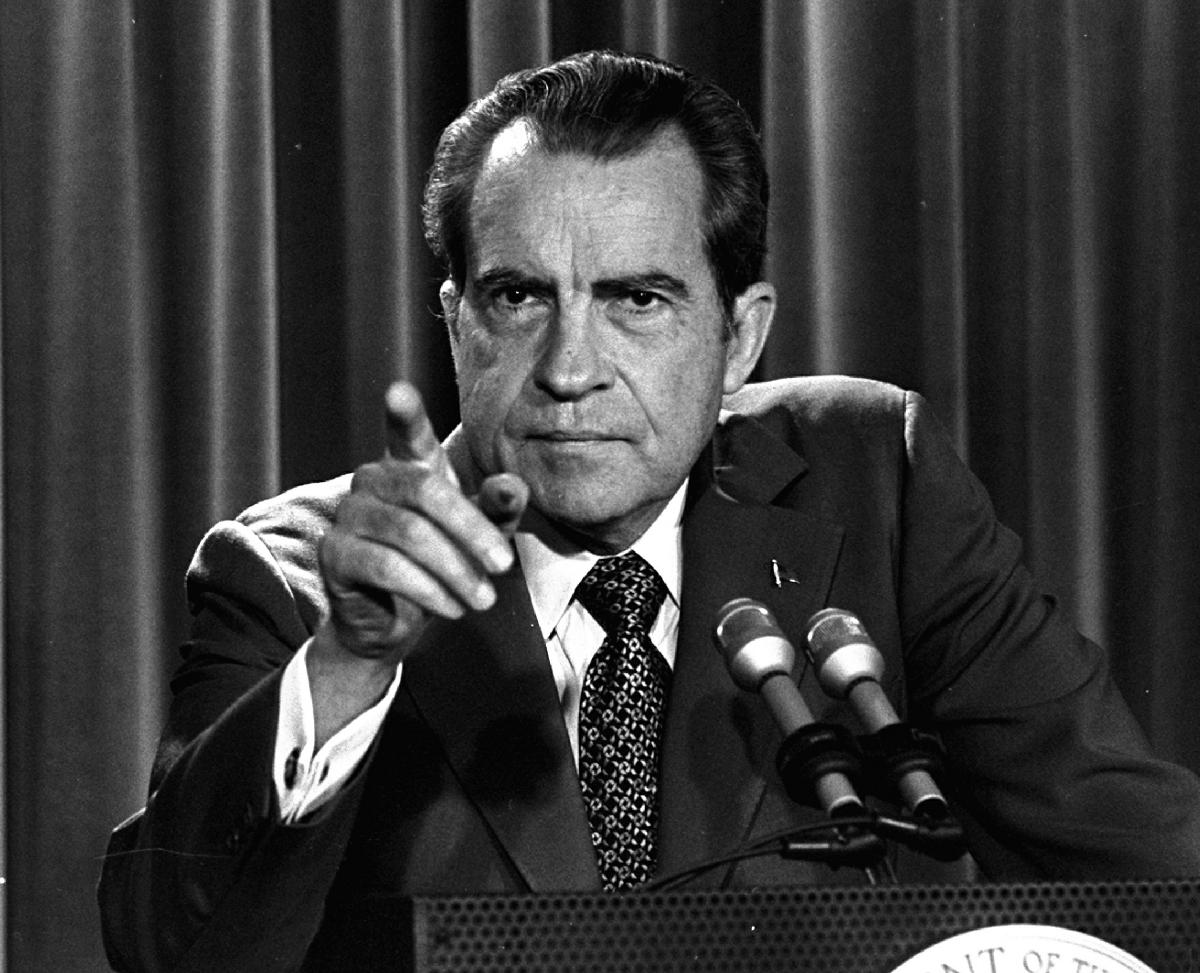23. THE TROUBLED 1970s

WATERGATE

WATERGATE
 Nixon and the political world
Nixon and the political worldimmediately around him
 Congress strips the President of his
Congress strips the President of his
discretionary spending powers
The textual material on this webpage is drawn directly from my work
America – The Covenant Nation © 2021, Volume Two, pages 226-231.
Nixon was a private man, disliking crowds and
preferring to deal with the world quietly from behind closed doors. He
clearly was at ease and happy when working personally with others. But
when in front of a crowded pressroom, Nixon appeared nervous, defensive
and cold, very uneasy in handling questions and clearly uncomfortable
when sensing a challenge by members of the press. And this latter side
of him was the side that became the public image of the man. Because of
his personal nature he preferred foreign politics, usually handled
personally from head of state to head of state, rather than domestic
politics, which required much more of a public presence. Consequently,
he largely turned domestic matters over to trusted cronies – which was
a very risky move. Also, because of his sense that the press
and other popular figures "were out to get him" (which was mostly
true), he developed a very defensive spirit with respect to the
political world immediately around him in Washington. He kept an
enemies list and developed a siege mentality inside the White House as
he found that despite his efforts to bring America to a post-Vietnam
era of peace and prosperity, his political opponents never let up in
their opposition (which he interpreted as a personal attack). Politics,
of course, has always been highly adversarial, as Nixon himself knew
well. Nonetheless knowing this did not lessen his sense of paranoia, a
mentality that ultimately would destroy him. Indeed, his sense of there being enemies
out there in American political society was not entirely fanciful. The
Boomers' heroic hunt for authoritarianism in high places did not stop
just because Johnson had left office. It simply switched to Nixon as he
took office as President. He was the new imperialist in the White
House. The fact that he had opened new relations with the Chinese, had
lessened the tensions of the Cold War with the Russians, and had
brought hundreds of thousands of American soldiers out of Vietnam did
nothing to appease this vigilante mood of the Boomers (and their
intellectual mentors). He received no thanks at all from them for his
achievements Youthful emotions were still running high
in the street. And it seemed that the Boomers wanted to keep it that
way. As the Beatles' song Revolution (1968) put it:
This spirit of radical protest pumped political adrenaline and helped maintain a revolutionary "high" among the Boomer youth.
Then when Nixon and his Silent Majority of middle-class Vet voters
soundly defeated McGovern and his vanguard of the Boomer revolution in
the 1972 elections, the mutual animosity grew all the more intense
between the two groups. The younger, rising Boomer world, and its
youngish "Progressive" mentors, viewed Conservative America as if it
had developed out of a very bad Fascist nightmare. For the
Boomer-Intellectual party, possessing a virtually limitless contempt
for the world of the Vets and their champion Nixon, there could be no
moral compromise in this battle.
Opposing lines formed for battle when, during the
summer of 1972 presidential election campaign, some of Nixon's
re-election staff were caught by police undertaking "dirty tricks," by
breaking into the Watergate offices of the Democratic National
Committee in Washington, D.C., to plant bugs or listening devices. What
was a totally unneeded1
event in the realm of dirty tricks – that sadly but also typically go
on in high-stakes political campaigns – soon turned itself into a major
scandal when two young Washington Post
reporters (Bob Woodward and Carl Bernstein) decided to pursue the
story, a story leading hopefully all the way to into the White House if
possible. In this they had inside FBI help in unfolding the story as
one after another individual on Nixon's campaign staff was implicated
in the affair. With the trial of the Watergate burglars
finally beginning in January of 1973, immediately the cry went up for
the strongly Democrat-controlled Congress itself to look into the whole
affair. The person seemingly now leading the Democratic Party, Senator
Ted Kennedy, sponsored a resolution in February of 1973 to set up a
select committee2 of four Democrats and three Republicans to investigate the activities of the 1972 Nixon campaign committee. At this point Nixon himself had done
nothing that could have produced any reason to have him impeached. For
Nixon, the difficulty arose only when the Kennedy-inspired inquiry into
the event to see if it would lead to the White House actually got
underway. At this point a huge political storm quickly developed
between Nixon and those called to investigate his 1972 campaign
operations. To the understanding of Congress, any attempt to impede a
wide-ranging search for irregularities in his conduct of his office
would itself automatically place that activity in the category of
"Treason, Bribery, or other high Crimes and Misdemeanors" (Article II,
Section 4 of the U.S. Constitution). And indeed, by very instinct,
Nixon would do what he could to head off this search of him and his
office for any evidence that an investigative team could find to have
him removed from the presidency (and even sent off to jail afterwards
as a private citizen). Only at that point would Nixon find himself in a
position where his Congressional (and press) enemies would have
supposed grounds to bring down "the evil president." In April of 1973, sensing that the axe
would likely fall on him, Nixon's own Legal Counsel, John Dean, offered
himself as witness against the president, claiming that Nixon himself
had actually authorized a post-event coverup of the affair (though he
himself had no actual evidence to present), and kept an enemies list of
his opponents (not exactly uncommon in politics), supposedly indicative
of Nixon's general abuse of power. This was the kind of political feed
that not only Congress but also the press was looking for. Indeed, a
political feeding frenzy was under full go at this point. Sensing the world closing in on him,
Nixon that same month began the firing of key White House and Cabinet
officials, supposedly action on the president's own part to distance
himself from those directly involved in the Watergate affair. But
whatever he hoped that might achieve instead proved pointless, actually
making these firings appear to be more like some kind of admission of
guilt in high places. By May of 1973 the Senate was ready to go
public in their investigation, with a series of hearings followed
widely across the country. When in July it was revealed that Nixon
had tapes recording conversations he had had with various staff and
government officials (as part of the material he wanted to have to help
him later write his White House memoirs) Congressional pressure was on
to get those tapes, which Nixon declared were personal (indeed
presidential conversations were always considered to be sensitive and
thus out of the reach of Washington politics). But the Special
Prosecutor Harvey Cox issued a subpoena for those tapes anyway, which
Nixon resisted. Finally in October an angry Nixon (this battle between
the White House and Congress had now been going on for nine months)
ordered his Attorney General Eliot Richardson to fire Cox (the Attorney
General indeed did have such authority in this matter), but Richardson
resigned instead. The same happened when Nixon then turned to the
Deputy Attorney General William Ruckelshaus. Finally, Solicitor General
Robert Bork carried out the order, the action actually hurting rather
than helping Nixon in this battle. In any case, Bork then had to
appoint a new Special Prosecutor, Leon Jaworski, and the battle
continued. By this time, Watergate had become
high-drama politics. Nixon now seemed like a man on the run. Americans
were glued to their televisions (the afternoon soap operas had even
given way to the televised Congressional hearings) as both houses of
Congress deliberated on the Watergate matter. In short, a public trial
was being held, even before formal charges could be presented and an
indictment actually issued. But all the drama was putting the names and
faces of multiple Congressional officeholders in front of the voting
public. It was great political publicity, seeing these individuals
defending American democracy against the imperialist presidency. Meanwhile the Department of Justice
announced that it was investigating Vice President Spiro Agnew for
taking bribes for government contracts when he previously served as
Maryland governor. In early October Agnew resigned, and that same day
Nixon announced that he was appointing the well-liked Michigan
Congressman (and head of the Republican Party in the House) Gerald Ford
as his vice president. In November the appointment was approved by both
houses of Congress by huge majorities. The following March (1974) the case moved
beyond the White House and Senate battlefield when a Washington, D.C.
grand jury indicted seven of Nixon's closest staff-members of
conspiring to hinder the Watergate investigation, after two others
(including Dean) pleaded guilty to the same charges. Finally in April Nixon agreed to release
written transcripts of the much-sought-after White House conversations.
Deeply shocking to the public was Nixon's use of vulgarity, and
comments he had made about this social group and that religious group.
At this point Nixon's embarrassed Republican supporters in both
Congress and in the nation began to drift away from him.3 But even worse for Nixon, conversations
Nixon had held with his legal advisor Dean and others revealed that
Nixon had indeed been involved in the Watergate coverup, at least to
the extent that Nixon back in March of 1973 had been part of a
discussion concerning the demand for hush money coming from E. Howard
Hunt – and potentially all of the Watergate burglars – blackmail funds
that might possibly have to be paid out secretly to keep them quiet
about any connections they might have had with the Nixon team. This was
the "smoking gun" the prosecutors (and the press) were looking for.
They finally had Nixon. 1However,
the break-in was likely motivated in part by the hope to find precise
information about Democratic National Chairman Larry O'Brien's exact
connections (if there actually were any) with the incredibly wealthy
but highly secretive Howard Hughes. It seems that the Democrats had
been feeding information to Nixon through his rather improvident
brother Donald that Nixon was going to lose the 1972 campaign because
O'Brien had damaging information about Nixon given him by Hughes –
including evidence that the gift of $205,000 from Hughes back in 1957
to rescue Donald's failing restaurant business was actually given as a
political favor for then Vice President Nixon. Such information – true
or not true – would have damaged the 1972 Nixon campaign tremendously.
However, the whole thing was likely a hoax. But this was the kind of
misinformation that the Democrats were hoping would put Nixon in a
self-destructive frenzy. Unfortunately, it was not untypical of the
kind of antics that go on in races for political office. But in any
case, it did succeed after all (quite ironically) if this is what got
the Nixon team to attempt the disastrous Watergate stunt. 2For
various reasons, however, it would be Sam Erwin, not Kennedy, who would
chair the Senate Committee doing the investigation. One explanation
offered was that having Kennedy head up this committee, a man who had
high hopes of being the Democratic Party's Presidential nominee in the
1976 national election, might make the investigation look partisan! An
unspoken explanation was that Kennedy's own moral credentials since the
Chappaquiddick incident were hardly admirable. 3Political
morality can be very selective. Truman and Johnson were just as likely
to use such salty language and offer unkind opinions on this group and
that when president. And this kind of behavior behind Washington
politicians' closed doors was not uncommon – including among some of
those Congressmen who sat in judgment of Nixon. It is just that in
general such privileged conversations were never allowed to leave
through those closed doors. This does not justify Nixon's language or
his opinions. But it raises questions about the level of political
hypocrisy in Washington. White House
Legal Counsel John Dean
– September 17, 1970 Nixon and H.R.
Haldeman – White House
chief of staff – February 10, 1971 Jeb Magruder
and Special Counsel to
the President Chuck Colson – June 1972 Nixon's Committee to
Re-elect the President
(CRP / also known as CREEP!) – summer of 1972
Headed by former Attorney General John
Mitchell The Watergate
apartment complex –
Washington,
D.C.
The Senate Watergate Hearings
– Summer of 1973 (Senate Select Committee
on Presidential Campaign Activities) Republican Senator Howard
Baker and Democratic Senator and Committee Chairman Sam Ervin directing the Senate Watergate
Hearings
Senate Chief
Counsel Samuel Dash (center)
conferring with Washington Post reporter Carl
Bernstein and CBS correspondent Leslie Stahl – June 3, 1973
White House Legal Counsel
John Dean at the Senate Watergate hearing John Dean testifying against
his former boss Nixon at the Senate Watergate hearings
John Dean testifying at the
Senate Watergate Hearing – June 1973 Former
domestic policy advisor John
D. Ehrlichman testifying before the Senate committee July 24, 1973
While all of this Watergate political drama was
underway, Congress had already begun to flex its muscles against the
"imperialism" of the White House in other areas. Congress moved to take
away the President's discretionary spending powers, his powers to
impound funds which Congress had voted to be spent.
Since ancient times, the contentious issue of government spending had
normally been one arising from the overspending tendencies of the heads
of state (kings, emperors, etc.). The role of legislatures was
typically understood to be to rein in that spending, generally by
refusing to authorize revenues for kings or emperors by way of new
taxes. When the American Constitution was set up it was done so with
the idea in mind that the House of Representatives would continue to
play that restraining role within the national government. All
authorizations of government spending had to originate in the House of
Representatives. The President could spend no more than he was
authorized by the House. But what was happening under Nixon was
that he was underspending, not overspending, with respect to the
operations of government. He had promised to cut back on government
spending, and did so by simply impounding or refusing to release funds
for a number of spending programs that he felt were unnecessary or at
least unnecessarily costly. Congress fumed. Legislative programs that
brought jobs and spending back to the Congressmen's home constituencies
(plus also jobs in Washington, which the Washington bureaucracy
protected at all costs) were what they depended on to stir support for
their incumbency. Legislators could always point proudly to the amount
of federal spending ("pork barreling") that they had directed back to
the folks at home. Being that the President was in deep
trouble over Watergate and on the political defensive on all political
fronts, Congress decided to move, to bring "responsibility" to federal
spending. They passed the 1974 Congressional Budget and Impoundment
Control Act which forced the President to get Congress's consent to
impound or not spend any of the amount authorized in the Congressional
budget. They thus stripped the President of important financial powers
that reached all the way back to 1801, at the time of Jefferson's
presidency. And they did this in the name of democratic
anti-imperialism. They also set up the Congressional Budget Office
(CBO) to stay on top of exactly what was being spent and where. The
idea was to follow up on details to make sure that the President was
obeying Congress's spending directives. But the CBO would also, in the future,
come to have the unintended effect of giving critics of out of control
Congressional spending – in particular, lavish pork barrel programs of
the Congressmen – plenty of detailed facts to work with!
IMMEDIATELY AROUND HIM
You say you want a revolution,
Well, you know
We all want to change the world
But sadly, as events would soon demonstrate, this meant that the person
standing closest to the President in line of succession had no power
base of his own to operate from. He could be only a very weak president
if he were to inherit the office and then come under political attack,
such as Congress was presently waging against the imperialist
presidency.
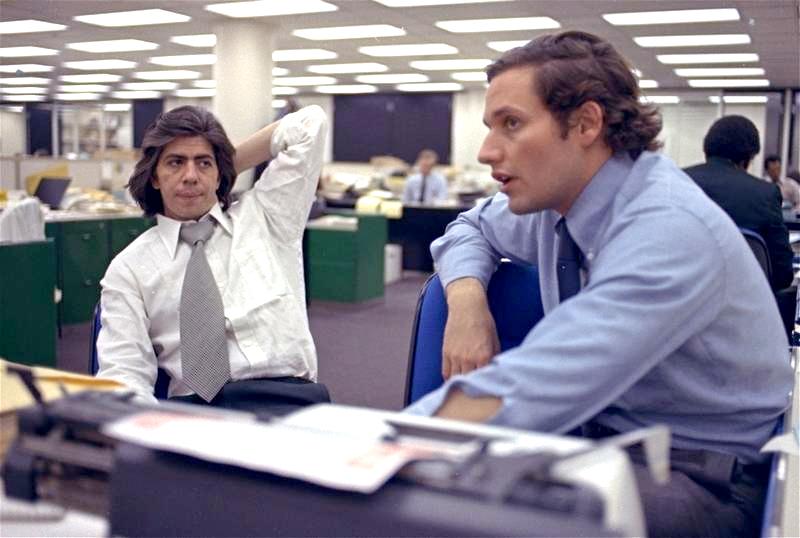
Washington Post reporters Carl Bernstein (left) and Bob Woodward
(right)
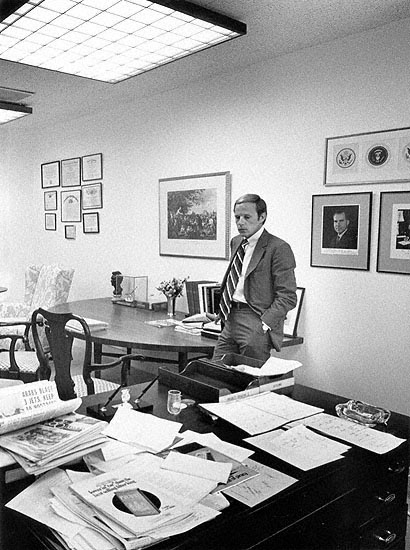
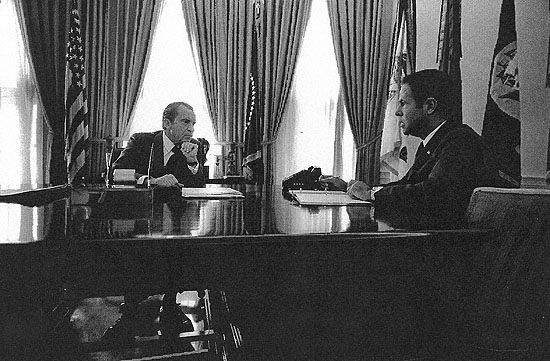
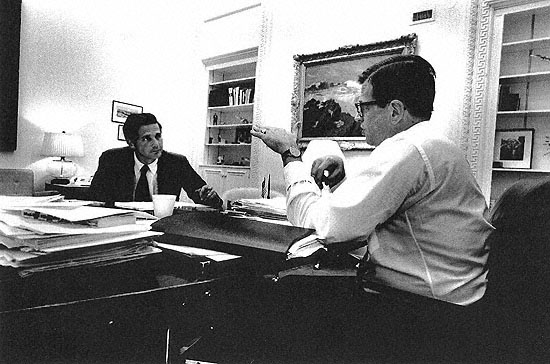
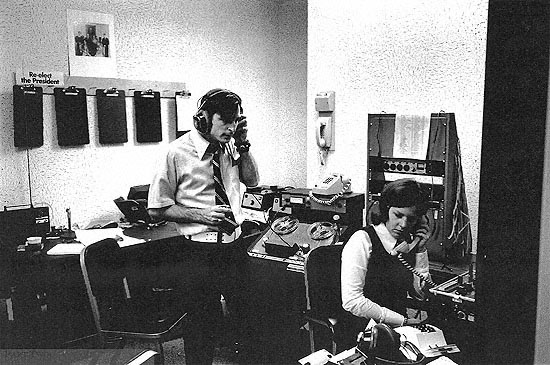
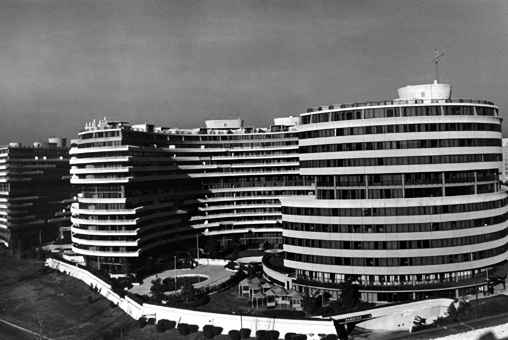
where the Democratic national headquarters
were located
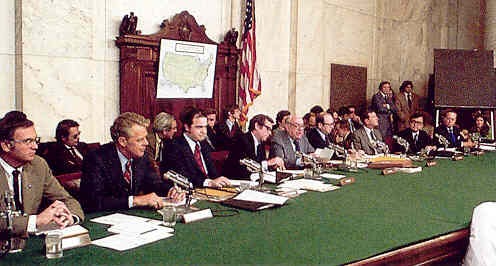
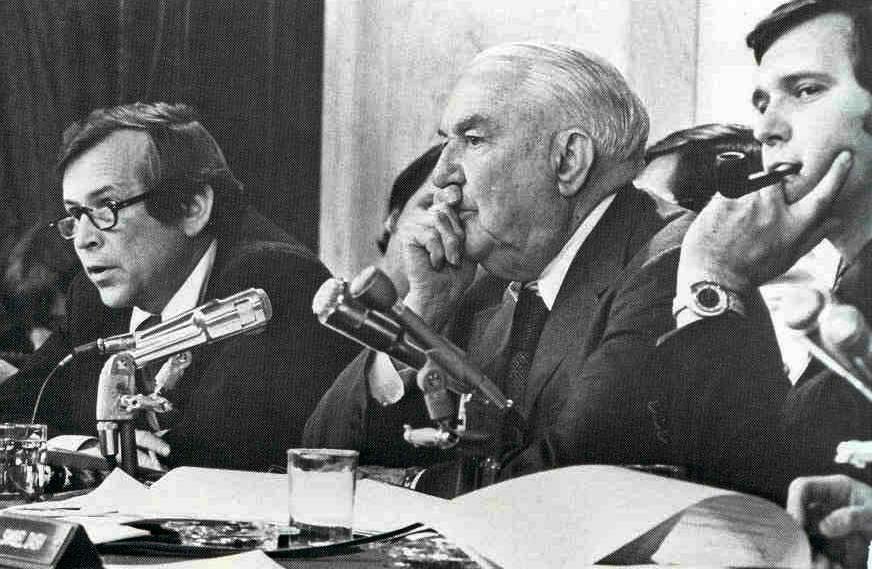
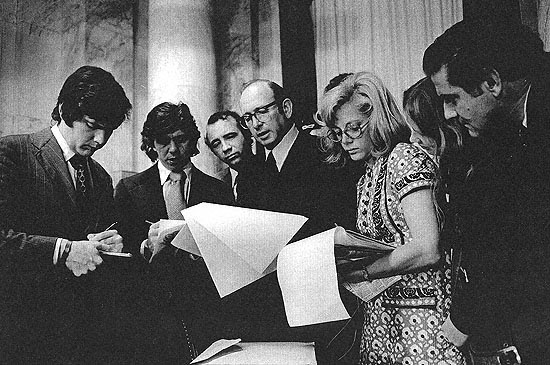
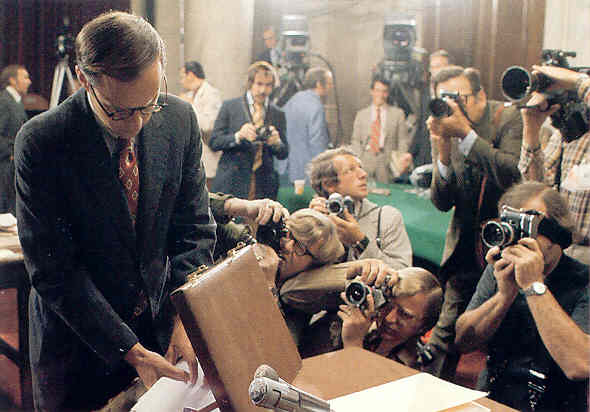
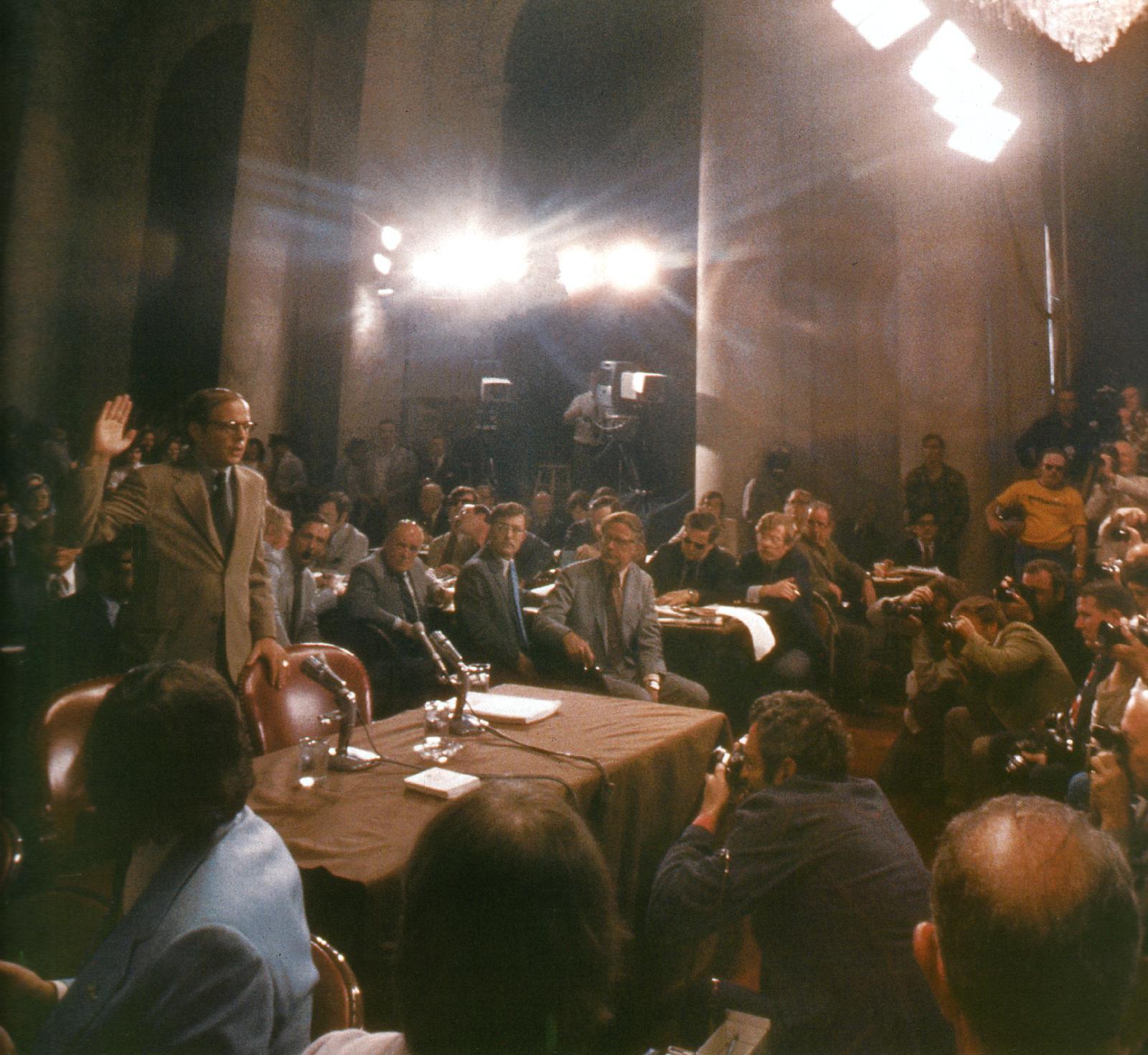
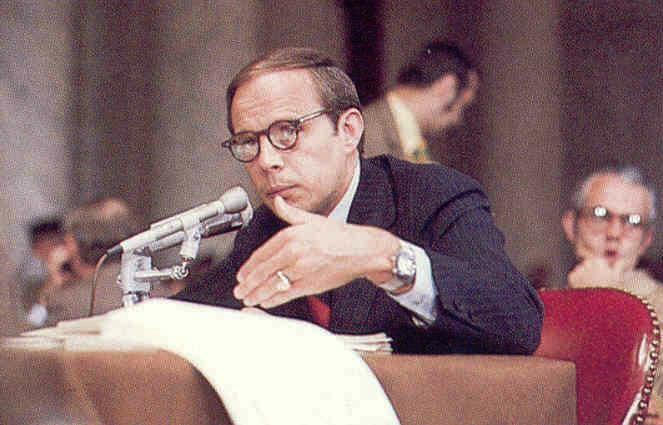
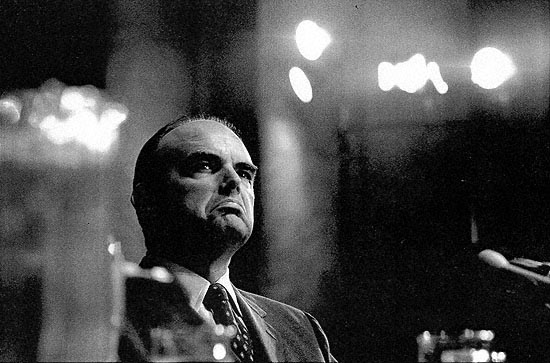
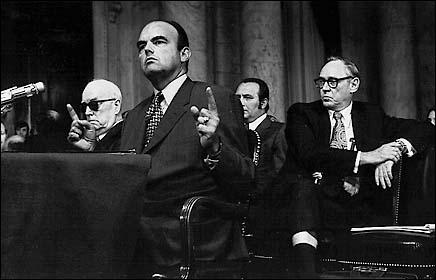
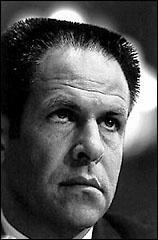
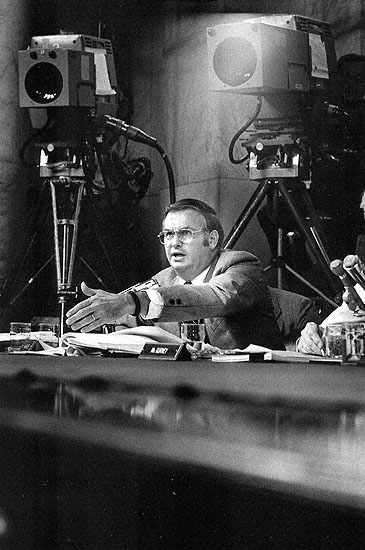
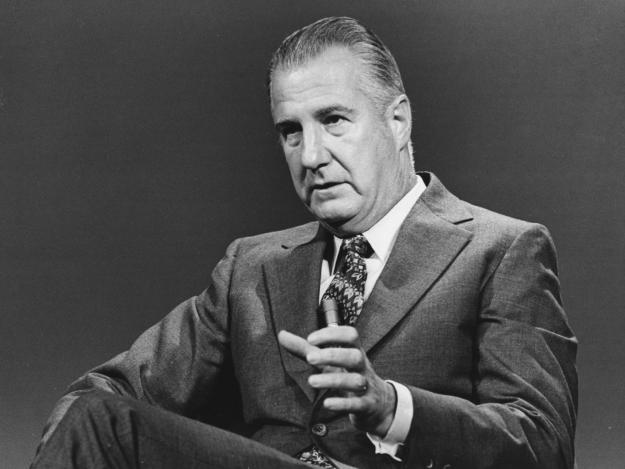
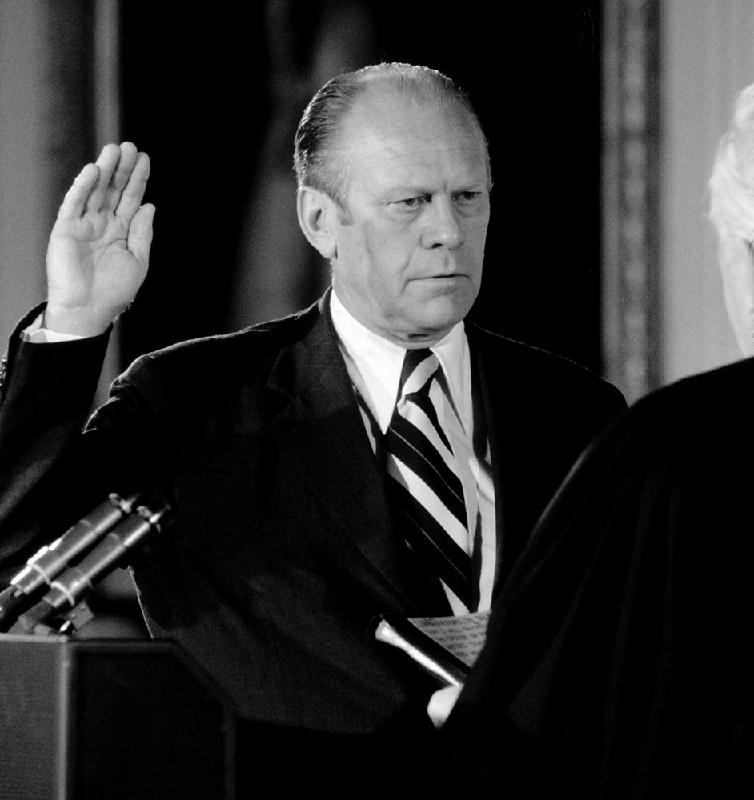
But of course Ford had been elected to the position by Congress … not the American people. This would matter considerably in the future … as to exactly how much power – and from where that came – that he could command as president

Go on to the next section: Difficulties in the Realm of Foreign Policy


